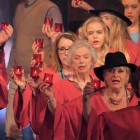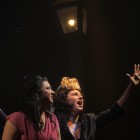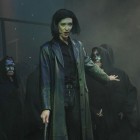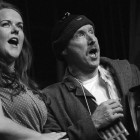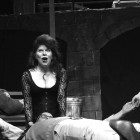Zauberflöte 2017Fife Opera
Read more about the opera Magic Flute
The Magic Flute took a while to catch on in Britain, invariably given as a grand opera in Italian (Il flauto magico) until Professor Edward Dent provided a usable English translation for the Carl Rosa company in 1911. That is an indication that it is a very complex piece to bring off in performance. In spite of its reputation, generally misleading, as a near-pantomime, many professional opera companies have come a cropper with it over the years. The lyrics in Dent's version still sound well, and director Douglas Nairne made a good job of redrafting the dialogue in a satisfactory way - removing some of the less savoury and dated elements that can seem both mysoginistic and racist.
All credit to Fife Opera for bringing their staging off with such success. Under the guidance of conductor Alistair Digges, the orchestral standards were remarkably high, with the band led by St Andrews-based Francesco Scattolini. It was all naturally paced and featured many lovely instrumental solos from the pit. The designs were based on a set on two levels, with several multi-purpose doors at ground level across the back. Seating units could be slid in from the wings to represent jury boxes for the discussions and trials of the second half, at which point it looked like an appropriate panelled chamber. Women were permitted to take a prominent role in these debates.
As with last year's Onegin, good use was made of an excellent chorus of children. The three boys, 'knaben' in the original, became spirits in the Dent translation, since boys were never available on tour in Britain, and the parts were invariably taken by women. Here a couple of their appearances were given to the choir of children - a highly effective variation.
Many of the major roles were double-cast, with singers doing alternate shows - another indication of the company's health, when so many performers are available for solo roles. Sarastro was originally cast that way too, but, in the event, the first cast singer took all four performances. Russell Malcolm is usually identified with baritone roles, but here managed to project the High Priest's low register quite successfully. Brandon Low was effective as the evil Monostatos. In line with modern practice, the director wisely ditched the once-traditional blacking-up of this character - no longer acceptable - and adjusted the dialogue to suit. George Nairne gave a relaxed performance as the Speaker, whose opening solo is so important in introducing us to the priestly community.
Unfortunately it was only possible for us to see the last of the four performances, a Saturday matinee that attracted a large and enthusiastic audience that contained many children, The second cast was led by an excellent young lyric tenor, Connor Smith, as Tamino, with baritone Jonathan Kennedy as Papageno. They both sang with ease and were confident actors. Their handling of the dialogue was equally good - the upper-class prince speaking in 'Received Pronunciation' while the birdcatcher was confident in his cockney.
Natalie O'Reilly sang consistently well as Pamina, while Gabrielle Sargent sang sweetly as Papagena and had no difficulty pulling off her old lady act. Lisa Lulis gave a vividly dramatic portrait of the Queen of Night, which worked well, even if her articulation of the fiendish coloratura wasn't quite perfect. The second squad of ladies also sang well, and gave enjoyably vampish portrayals, though they seemed less at ease with the cockney accents they were given.
In all this was a highly enjoyable outing for a glorious operatic masterpiece that can so easily trip up unwary performers.
Performance Cast
- Tamino a Prince
-
Kenneth Reid (Nov 1, 3)
Connor James Smith (Nov 2, 4)
- First Lady in attendance on the Queen
-
Frances Taylor (Nov 1, 3)
Rosemary Nairne (Nov 2, 4)
- Second Lady in attendance on the Queen
-
Eleanor Hubbard (Nov 1, 3)
Margaret Sharp (Nov 2, 4)
- Third Lady in attendance on the Queen
-
Barbara Scott (Nov 1, 3)
Elaine Young (Nov 2, 4)
- Papageno a bird-catcher
-
Jonathan Sedgwick (Nov 1, 3)
Jonathan Forbes Kennedy (Nov 2, 4)
- Queen of Night
-
Ana Pousa (Nov 1, 3)
Lisa Lulis (Nov 2, 4)
- Monostatos a servant in the Temple
- Pamina daughter of the Queen of Night
-
Freya Holliman (Nov 1, 3)
Natalie O'Reilly (Nov 2, 4)
- Speaker at the Temple
- Sarastro High Priest of Isis and Osiris
- First Boy
-
Catriona Gauld (Nov 1, 3)
Aimee Lindsay (Nov 2, 4)
- Second Boy
-
Hale Denholm (Nov 1, 3)
Jennifer Paton (Nov 2, 4)
- Third Boy
- First Priest
- Second Priest
- Papagena disguised as an old woman
-
Zoe Perman (Nov 1, 3)
Gabrielle Sargent (Nov 2, 4)
- First Armed Man
- Second Armed Man


